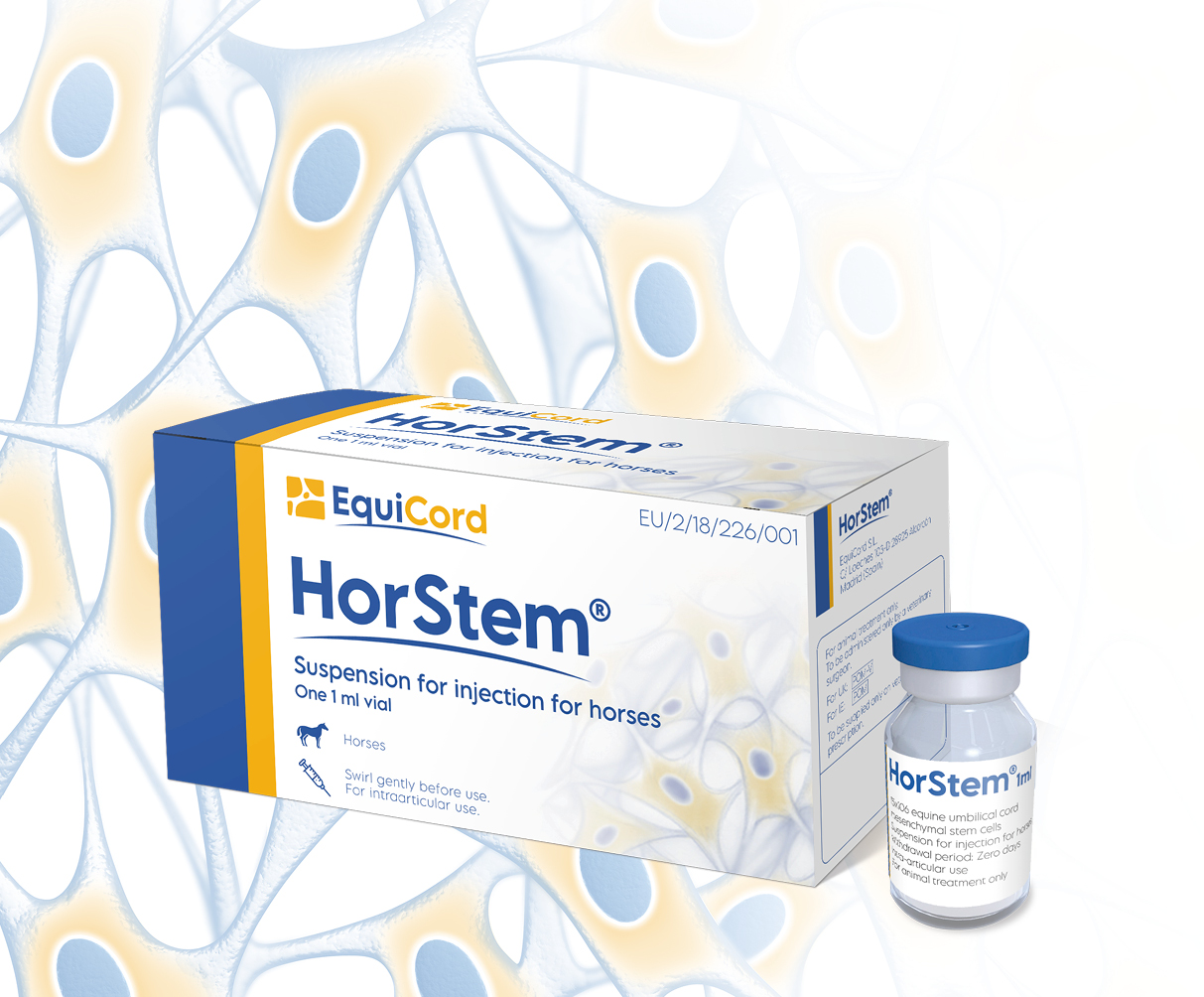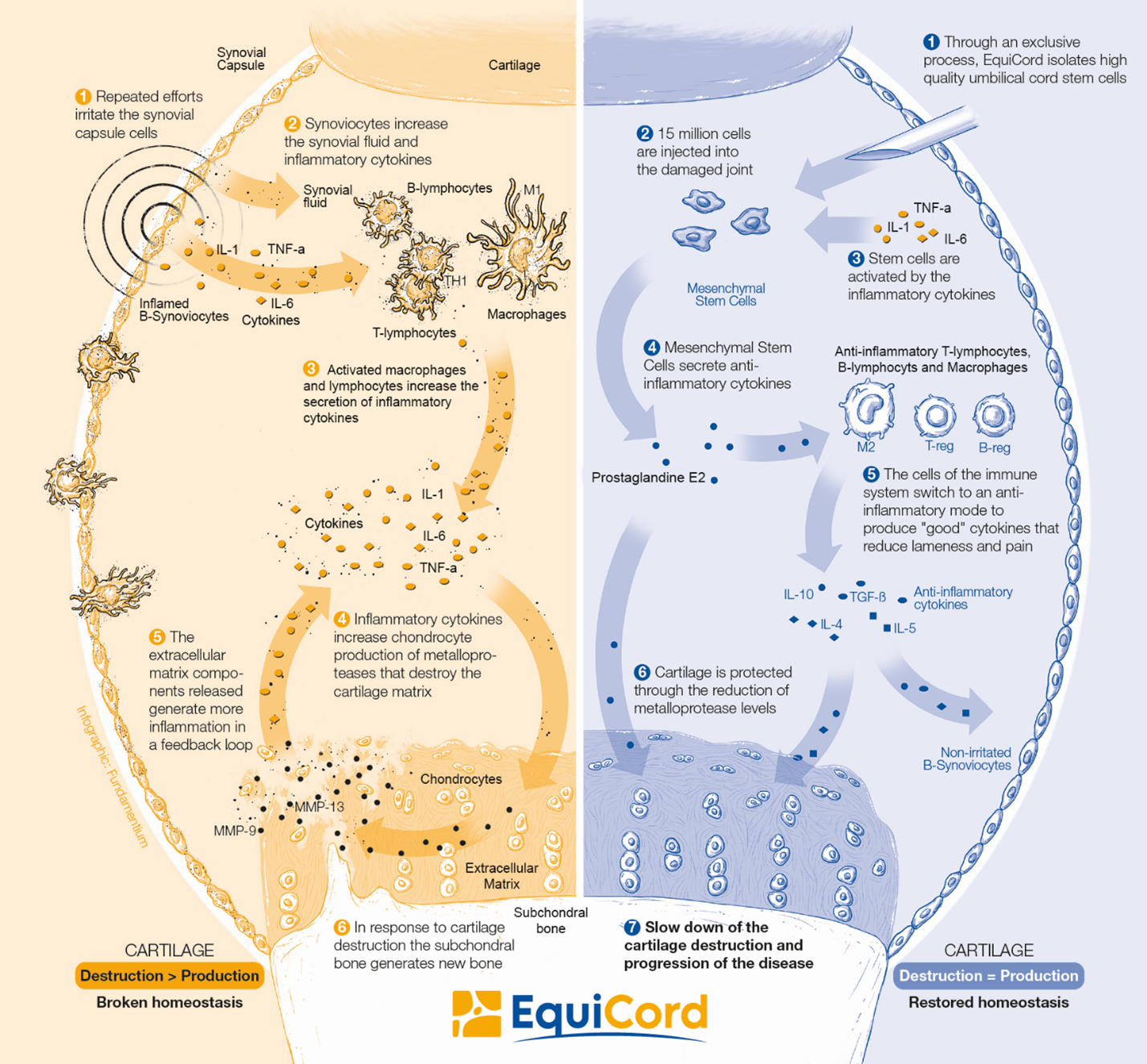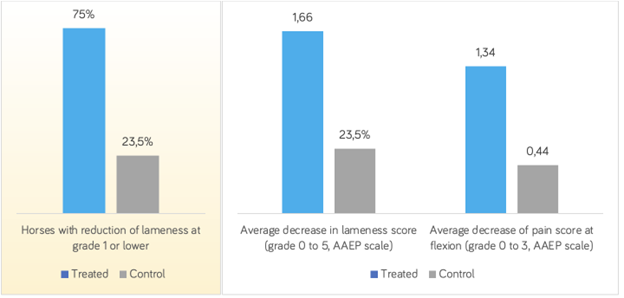
Osteoarthritis (OA) is a chronic, degenerative inflammatory process in the joints involving damage to cartilage and abnormal bone growth. It is a major cause of lameness in horses; in some studies, 60% of the lameness’s could be related to OA.
Treatment of osteoarthritis often aims to reduce inflammation and control pain. This is achieved by treatment with nonsteroidal anti-inflammatory drugs (NSAIDs) or intra-articular corticosteroids (COs). Nowadays, an increasing number of therapies are applied that are intended to affect cartilage metabolism and joint function, such as hyaluronic acid (HA), polysulphated glycosaminoglycans (PSGAG) and pentosanpolysulphate.
In recent years, an increasing focus has been on orthobiologics, which are biological substances used to treat orthopaedic conditions. In OA, autologous substances such as autologous protein solution (APS) or stem cells from bone marrow are used, for example. Allogeneic orthobiologics, obtained from other horses, in OA include stem cells.
HorStem
HorStem is the first licensed veterinary medicine composed of mesenchymal umbilical cord stem cells. It is a ready to use, sterile, injectable suspension for intra-articular use in horses. Each vial contains 15 million equine umbilical cord stem cells. It is indicated for horses with mild to moderate OA and reduces lameness associated with this disease.
HorStem umbilical cord mesenchymal stem cells mechanism of action
The mechanism of action of HorStem umbilical cord mesenchymal stem cells is shown in the image below.
Umbilical cord mesenchymal stem cells are activated in the synovium by inflammatory cytokines, in response they secrete anti-inflammatory cytokines such as Prostaglandin E2 (PGE2).
Although PE2 is mostly known for its pro-inflammatory influence, it also has an important role in regulating inflammation. It is known as one of the greater immunomodulatory cytokines in the body.
The application of umbilical cord mesenchymal stem cells in horses with OA inhibits T-cell proliferation, the production of pro-inflammatory cytokines such as TNF-alpha and reduces the presence of matrix metalloproteases (MMP) that cause degradation of the extracellular matrix of cartilage. Studies have shown that these effects are mediated by PGE2.
Umbilical cord mesenchymal stem cells also stimulate the production of anti- inflammatory cytokines such as IL-4, IL-5, IL-10 and TGF-beta. As the inflammatory response ends and the amount of MMP decreases, cartilage destruction and disease progression will stop.
Stem cells create the ideal environment for tissue regeneration. The inflammatory symptoms and associated lameness will also resolve.


Results of treatment with Horstem
A comparative superiority, multicentric, parallel, blinded, randomized and placebo-controlled clinical trials were performed. Horses were randomly assigned to receive a treatment with HorStem (N=36) or a placebo containing saline solution (N=39). The horses were evaluated based om lameness grades, joint effusion and flexion pain. Additionally subjective improvement observed by the veterinarian and the owner were taken into account.
The group treated with Equine Umbilical Cord Mesenchymal Stem Cells showed a greater reduction in lameness score and pain score compared to the placebo group. In addition, 75% of horses treated with Equine Umbilical Cord Mesenchymal Stem Cells had lameness scores reduced to an AAEP score of 1 or lower (non-lame or inconsistent lameness) by day 63.


The study showed that clinical improvement persisted for more than a year in 84% of the treated horses.
HorStem is available immediately
HorStem is available immediately for the Netherlands, Germany, Poland and Belgium.
Grovet has extended their partnership with Equicord and is now the official distributor of Horstem in Belgium. We are very happy that we are now able to provide our Belgian clients with this excellent product. Visit our product page for more information and to purchase this product.
References
Goodrich LR, Nixon AJ. Medical treatment of osteoarthritis in the horse–a review. The Veterinary Journal. 2006 Jan 1;171(1):51-69.
Pradera Muñoz, A. Efficacy and safety study of allogeneic equine umbilical cord derived mesenchymal stem cells (EUC-MSCs) for the treatment of clinical symptomatology associated with mild to moderate degenerative joint disease (osteoarthritis) in horses under field conditions. 2019
McIlwraith CW, Frisbie DD, Kawcak CE. The horse as a model of naturally occurring osteoarthritis. Bone & joint research. 2012 Nov;1(11):297-309.





